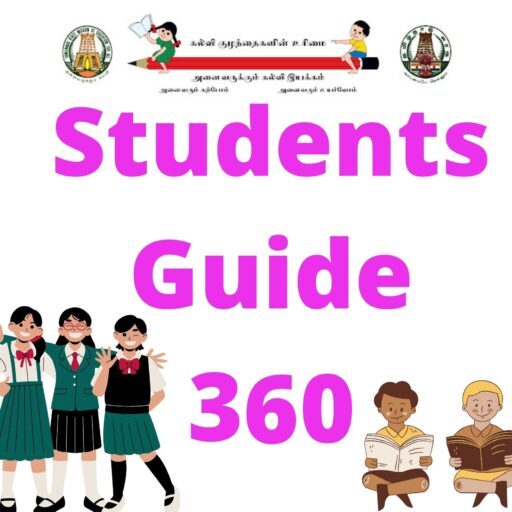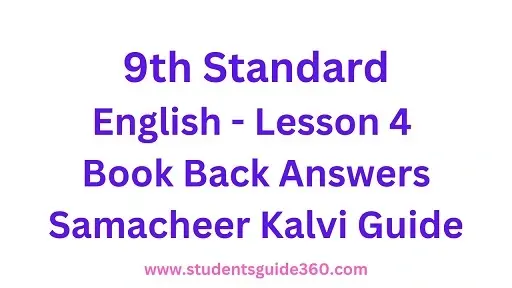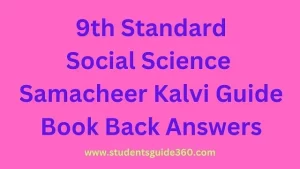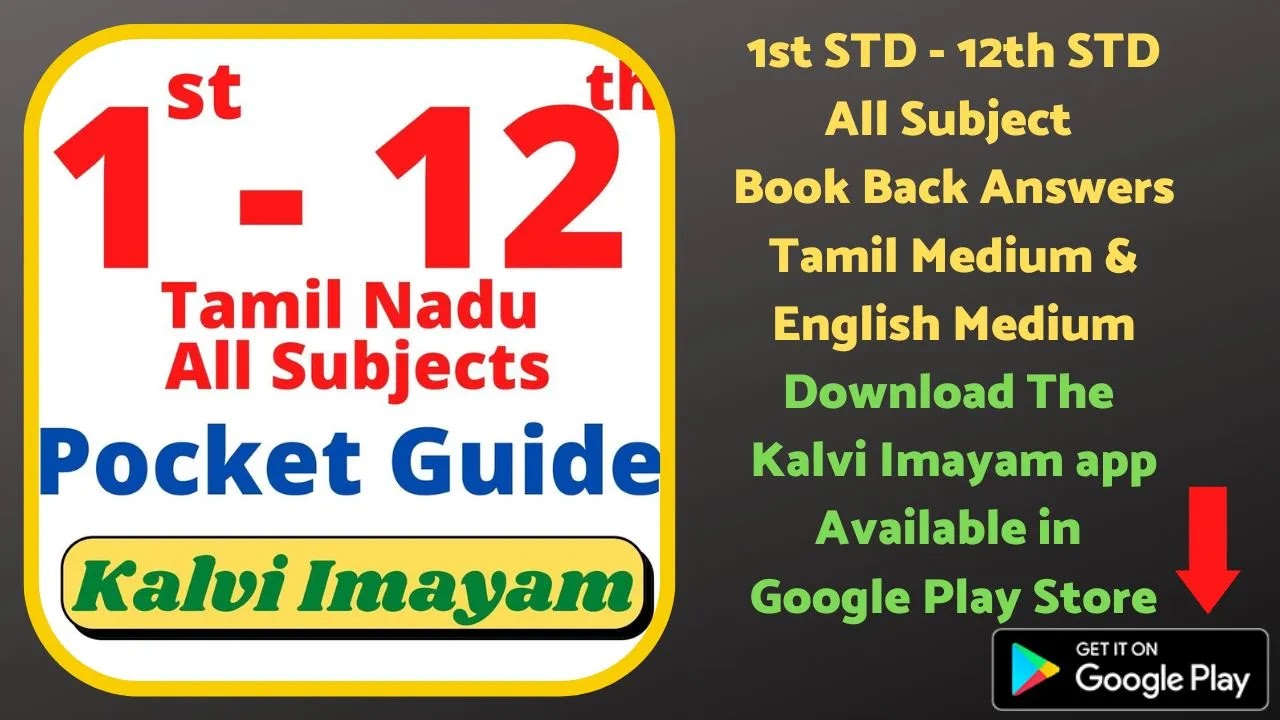9th English Unit 4 Prose Seventeen Oranges Book Back Answers
9th Standard English Seventeen Oranges Solution
9th Standard English Lesson 4 Unit 4 Prose Seventeen Oranges Book Back Answers and Additional Questions and Answers Download pdf. 9th English Samacheer Kalvi Guide Book in Answers. 9th Standard All Subject Guide Tamil Medium and English Medium. 9th English Important Questions. Class 1 to 12th All Subject Guide.
Lesson 1.1 Seventeen Oranges
Glossary
- dock (n) – an enclosed area of water in a port for the loading, unloading and repair of ships
- apron (n) – a protective garment worn over the front of one’s clothes and tied at the back
- red-handed (adj) – used to indicate that a person has been discovered in the act of doing something wrong
- concealed (adj) – the act of keeping something secret or hidden
- blabbing (v) – to reveal secrets indiscreetly and thoughtlessly
- pips (n) – small hard seeds in a fruit
- chunks (n) – thick large pieces of something
A. From your reading of the text, choose the correct answers from the options given below.
1. The narrator was very fond of ________________
- eating oranges.
- driving a pony-and-cart.
- reading detective stories.
- munching away at something.
Ans : eating oranges.
2. The narrator was searched by the policeman, because __________
- his pockets were bulging.
- he was singing songs.
- he was carrying a box.
- the oranges could be smelt.
Ans : his pockets were bulging.
3. The narrator kept his mouth shut when questioned by Pongo, because __________
- anything said would be held as evidence against him.
- the oranges would fall out.
- he did not steal the oranges.
- he was scared of Pongo.
Ans : anything said would be held as evidence against him.
4. The voice in the narrator’s head advised him to____________
- confess the truth to Pongo.
- eat all the oranges.
- deny his guilt.
- hide all the oranges.
Ans : eat all the oranges.
5. Pongo found no trace of the oranges on the table, because ______
- Pongo’s mate had stolen them.
- all the oranges were sold.
- the narrator had eaten them all.
- they disappeared mysteriously.
Ans : the narrator had eaten them all.
B. Answer the following questions briefly in one or two sentences.
1. Why did the narrator call Clem Jones a careful planner?
- Clem Jones planned a theft carefully and executed it well.
2. What was Clem Jones carrying in the box during his second attempt?
- During the second attempt, Clem Jones was carrying a large Dutch cheese in the box.
3. Why did the policeman suspect the narrator?
- The policeman caught the narrator red-handed because the string of the narrator’s apron broke and the cop noticed that the narrator’s pockets were bulging.
4. What did Pongo consider as evidence against the narrator?
- Pongo considered the oranges to be evidence against the narrator.
5. How did the narrator feel when he was alone in Pongo’s cabin?
- When the narrator was locked in the cabin, he lost hope in life and felt afraid that he would lose his job.
6. What did the narrator do to get rid of the evidence?
- The narrator swallowed the pips and peels of the oranges beside the fruits to get rid of the evidence.
7. What did Pongo do when he found no oranges on the table?
- Pongo looked everywhere for the oranges. He looked in the narrator’s pockets and in his apron. He became angry and shouted at the narrator.
8. Why were the policemen not able to bring any charges against the narrator?
- As there was no evidence, the policemen could not bring any charges against the narrator.
9. How did the narrator feel after eating seventeen oranges?
- The narrator felt sick for a week and the oranges kept working away in his stomach.
10. What happened to the narrator’s love for oranges after the incident?
- The oranges worked away in the narrator’s stomach. He lost his love for oranges after the incident.
C. Answer the following in about 80 – 100 words.
1. Narrate the clever strategy followed by Clem Jones to deceive Pongo.
- Clem Jones was one of the narrator’s friends who worked with him at the dock. Clem was amazingly smart about stealing things from the docks and boats that he easily fooled the policemen with his great cunningness. Once, he carried a box and came out of the docks. The cop Pongo stopped him and investigated the box. Clem told that it had a cat. The cop insisted on opening it.
- When Clem did so, a ship’s cat jumped off and escaped into the docks. When Clem Jones returned with the box of cheese, he looked angrily at the policeman Pongo to make the policeman feel guilty of his previous act of opening the box, in which the cat was kept inside. By making Pongo feel guilty, Clem was able to avoid any more security checks and thus was able to steal a large Dutch Cheese.
(OR)
- There are expect thieves who plan it carefully. Clem was a good planner of theft. One day, while Clem was coming out of the docks with a box, Pongo stopped him. Fie asked him to open the box. She told Pongo that the cat would run away. Pongo did not believe him. So he made Clem open the box.
- Suddenly the cat jumped up and ran away. It was a ship’s cat. Clem ran after it shouting angrily. After two minutes, he came back with the same box. She held the lid down tightly. Pongo laughed at him but Clem looked at him angrily. He looked angry all the way home. Then he smiled. He opened the box and took out a large Dutch cheese.
“A clever fox can even deceive a dog”
2. Describe the confrontation between the narrator and Fongo.
- Title: Seventeen Oranges
- Author: Bill Naughton
- Characters: Narrator, Pongo, and another policeman.
- Theme: “Too much of anything is good for nothing”
The narrator used to work in the docks, carrying cargo from the docks. He had an irresistible love for oranges. He stole them, from the boats and ships and chew them for hours.
However one day he was caught by Pongo, the policeman. He wanted to make the narrator’s case an example for all the other workers and frighten them off the consequences of dishonesty and stealing.
The police officer locked him in a cabin and went out to bring another police officer to be a witness. The narrator ate up the seventeen oranges with their pips and peels. He damaged all the evidence against him. That was a very bitter experience for him. The policemen could not do anything against him. The narrator was never crazy about oranges anymore.
“Look before you leap”
Paragraph for Slow Learners
The narrator had a great love for oranges. He could eat oranges all day and every day. He worked in the shipyard. His irresistible love for oranges tempted him to steal the oranges from the boats and ships. One day Pongo, the policeman caught him. He had oranges in his pockets. Pongo wanted to make a case in order to frighten the other workers also.
He locked the narrator in a cabin. He went out to get another policeman as a witness. The narrator decided to damage the evidence. He ate all the oranges with the pips and peels. It was a bitter experience for him. The policemen could not do anything. They had to let him free. The narrator was never crazy about oranges thereafter.
“Covet all, Lose all”
D. Find the synonyms for the underlined words given in the passage.
1. The voice in his head asked the narrator to eat the evidence.
- proof
- contradict
- disprove
- refute
Ans : proof
2. Clem looked at Pongo furiously.
- politely
- gently
- angrily
- calmly
Ans : angrily
3. When Pongo caught the narrator with the oranges, he was very frightened.
- undaunted
- afraid
- valiant
- brave
Ans : afraid
4. The narrator was quiet, when Pongo questioned him.
- calm
- noisy
- silent
- agitated
Ans : silent
5. The narrator was in trouble because he took the oranges.
- peace
- difficulty
- harmony
- comfort
Ans : difficulty
E. Find the antonyms for the underlined words in the following sentences.
1. Seventeen oranges were hidden in the narrator’s pockets.
- exposed
- masked
- concealed
- buried
Ans : exposed
2. Clem Jones was ordered to open the box.
- prepared
- arranged
- forced
- requested
Ans : requested
3. Pongo locked the narrator inside the cabin.
- closed
- sealed
- released
- chocked
Ans : released
4. Pongo carefully searched the narrator’s pockets.
- attentively
- carelessly
- cautiously
- strictly
Ans : carelessly
5. The narrator of the story felt very sick for a week
- healthy
- disordered
- feeble
- unhealthy
Ans : healthy
D. Given below in Column A are some phrasal verbs taken from the text. Find the meanings by using a dictionary and complete Column B.
| Column A | Column B |
| Phrasal Verb | Meaning |
| 1. Fond of | Having a liking for |
| 2. Hidden away | Concealed |
| 3. Lock up | Shut up |
| 4. Laughed at | Made fun of |
| 5. Look at | Examine closely |
| 6. Bring up | Rear (deed and educate) |
| 7. Gave up | Stopped |
| 8. Went through | Experienced |
| 9. Finish off | Complete an activity |
| 10. Figure out | Understand |
Choose the correct option.
1. We use ______ (should/must/ought) when something is compulsory, obligatory and important.
Ans : must
2. We use ______ (should/must/ought) when something is the right thing to do.
Ans : ought
3. We use ______ (should/must/ought) when something is suggested or recommended.
Ans : should
F. Answer the following:
1. Frame a question using ‘have’.
I have never seen such i creature
Have you ever seen such a creature?.
2. Underline the modal.
How can we reward you?
3. Find the modal.
When will Tenali Raman go?
4. Choose the correct modal.
Who has (have / has) painted the peacock red?
5. Answer with may / may not.
Do you think red peacocks exist?
I think red peacocks may not exist.
G. Fill in the blanks with appropriated modals.
(Will / Shall, Would / Should, Can / Could, May / Might, Ought to)
Milk is a nutritious food enriched with vitamins and proteins. We should take milk regularly so that we might not develop deficiencies in our body. Aged persons, children and patients ought to take milk in sufficient quantities as it provides strength to their body/ We can supplement it with fruits, vegetables and pulses for proper growth of the body. But we must consume milk of good quality. Otherwise it will cause harm to the body. We should be very careful while selecting our food items because there are chances that these might be adulterated. We ought to protect our health.




